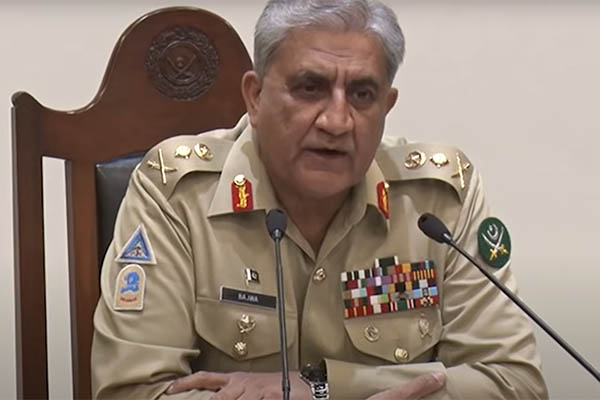
File photo of Chief of Army Staff Gen. Qamar Javed Bajwa. Courtesy ISPR
Chief of Army Staff (COAS) Gen. Qamar Javed Bajwa on Tuesday said the Kartarpur Corridor—a visa-free border crossing connecting Pakistan’s Gurdwara Darbar Sahib to India’s Gurdwara Baba Nanak—is a practical manifestation of Pakistan’s unwavering commitment to religious freedom and harmony.
According to a statement issued by the Inter-Services Public Relations (ISPR), the COAS conveyed his message to a 12-member delegation of British Sikh soldiers led by Major General Celia J. Harvey, the deputy commander of the British Field Army, during their visit to General Headquarters in Rawalpindi.
It said Gen. Bajwa had also stressed that Pakistan respected all religions and also recognized the need to promote religious tourism in the country. The delegation, per the ISPR, lauded the efforts of the Pakistan armed forces in bringing peace and normalcy to the country’s tribal districts.
The ISPR said that the delegation also visited Lahore, where it witnessed a flag-lowering ceremony at the Wagah border and visited the Lahore Fort, Allama Iqbal Mausoleum, and the Badshahi Mosque.
During their stay, the British Sikh soldiers visited several religious sites in Pakistan, including Darbar Hazrat Mian Mir, Haveli Nau Nihal Singh, Gurdwara Janam Asthan Guru Ram Das, Samadhi Maharaja Ranjit Singh, Gurdwara Dera Sahib, Kartarpur Corridor, Nankana Sahib and Dera Panja Sahib. They also visited Orakzai and Samana Fort, Lockhart Fort and Saragarhi Monument, where they laid a wreath.
The Saragarhi Monument marks the location where 21 Sikh soldiers laid down their lives in 1897 as part of a British expedition and has much historical significance for Sikhs.
